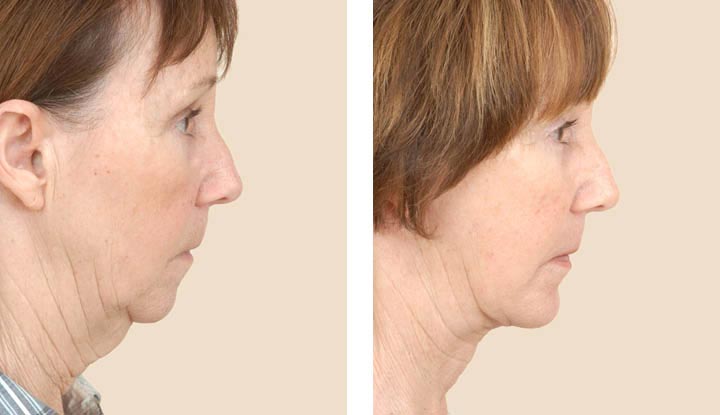A chin implant is a surgical procedure to enhance a small or recessed chin. Most people get chin implants for cosmetic reasons, such as improving the definition in their lower face. Some people get chin implants to reconstruct the chin after surgery or trauma.
Advertisement
Cleveland Clinic is a non-profit academic medical center. Advertising on our site helps support our mission. We do not endorse non-Cleveland Clinic products or services. Policy

Image content: This image is available to view online.
View image online (https://my.clevelandclinic.org/-/scassets/images/org/health/articles/23252-chin-implant)
A chin implant can help enhance a small or receding chin and add definition and contour to your lower face, profile and jawline. Most people get chin implants for cosmetic reasons, but sometimes, the surgery can help reconstruct your face. A plastic surgeon makes a cut in your skin, inserts the implant and molds it to your chin bone to achieve a natural, balanced look.
Advertisement
Cleveland Clinic is a non-profit academic medical center. Advertising on our site helps support our mission. We do not endorse non-Cleveland Clinic products or services. Policy
Other names for chin implant surgery are chin augmentation (enlargement) or chin enhancement.
Chin implants are usually made out of silicone, a flexible, artificial substance. Sometimes, implants are made from bone, but these aren’t as common. Implants come in different shapes, sizes and styles. Your surgeon selects the best type for your needs and aesthetic goals.
Anyone concerned about a small or recessed chin may consider chin implants. A recessed chin is when your chin doesn’t stick out far enough from your face. From the side, your chin isn’t in proportion with the lines of your forehead, nose and other features.
People who’ve had trauma to their face, such as a facial fracture or tumor removal, might also consider and benefit from a chin implant.
A chin implant might be part of or in addition to other surgeries, such as:
The ideal candidate for chin implant surgery is someone who:
Advertisement
A chin implant isn’t the only way to add definition to your chin and jawline. You may be able to have dermal fillers or fat grafting:
Your healthcare provider will give you instructions on how to prepare for chin implant surgery. You may need lab tests and a physical exam to make sure you’re in good health. If you smoke, you should quit smoking several weeks before the procedure.
Your healthcare provider may also ask you to stop taking certain medications before chin implant surgery. Let them know about any medications you take, including aspirin, anti-inflammatory drugs or herbal supplements. They may ask you to start taking antibiotics before surgery to reduce the risk of infection.
Your healthcare provider might take photos of your chin and side profile before surgery. Photos help your surgeon plan your procedure and compare before and after results.
During chin implant surgery, your care team and surgeon:
Depending on the complexity of your surgery, you may be able to go home the same day as your procedure. Less often, people stay in the hospital overnight. Your surgeon will give you specific instructions about how to care for your incision.
Like all surgeries, a chin implant does carry some risks, including:
Advertisement
A chin implant can:
You should take it easy for about a week or two after your chin implant. You can do light activities, but you should avoid:
You might notice swelling and bruising. Talk to your healthcare provider about the best way to care for your incision. They may recommend a soft food diet for a few weeks. Rinsing your mouth with salt water or a prescription dental rinse before and after meals can also help keep the incision clean and reduce pain.
Most people have favorable results after a chin implant. Many people report satisfaction with the outcome.
Contact your healthcare provider if you have:
A chin implant is a surgical procedure to enhance the size of your chin. Most people get a flexible silicone implant. The procedure can help add definition and balance to your chin and jawline. It’s a fairly low-risk cosmetic procedure. Some people get a chin implant with other procedures such as a rhinoplasty or facelift.
Advertisement

Sign up for our Health Essentials emails for expert guidance on nutrition, fitness, sleep, skin care and more.
Learn more about the Health Library and our editorial process.
Cleveland Clinic’s health articles are based on evidence-backed information and review by medical professionals to ensure accuracy, reliability and up-to-date clinical standards.
Cleveland Clinic’s health articles are based on evidence-backed information and review by medical professionals to ensure accuracy, reliability and up-to-date clinical standards.
Whether you need cosmetic or reconstructive plastic surgery, you’ll need skilled, detailed and compassionate providers. At Cleveland Clinic, we’re here to help.
